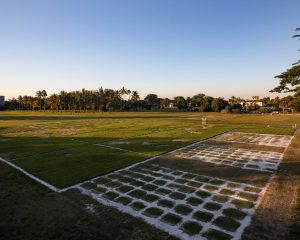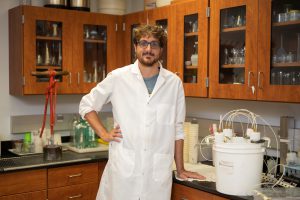FORT LAUDERDALE, Fla. – For a century, University of Florida scientists have focused their turfgrass research on determining the best varieties for the state’s diverse climate zones and soil conditions, and developing best management practices that are environmentally friendly and conserve water and fertilizers.

On March 31, the UF/IFAS Fort Lauderdale Research and Education Center will host the 33rd Annual South Florida Turfgrass Field Day and Exposition, at 3205 College Ave. in Fort Lauderdale. The event, organized in partnership with the South Florida Golf Course Superintendents Association of America, returns after a two-year interruption due to the Covid-19 pandemic.
A popular component of the event are the educational tours of the 4.5-acre turfgrass research plots. Participants can choose from a golf or landscape research tour. For the first time, the landscape tour will be offered in Spanish.
“While the Covid-19 pandemic put a hiatus on the annual field day and expo since 2020, our research to make South Florida lawns sustainable never stopped,” said Marco Schiavon, assistant professor of turfgrass science at the research center. “UF/IFAS is celebrating our 100th anniversary in turfgrass science, and our turf research in South Florida has led to the development of some of the best management practices for golf courses and private property.”
The event is designed for a wide range of audiences including homeowners, professional landscapers, golf course superintendents, parks and recreation sports turf directors and more. Registration is required for the day that provides speakers, lunch and a vendor show.
Tickets range from $47.25 for early registration that ends on March 25 to $52.50 for general admission beginning March 25.

Vendors provide a show-and-tell of mainstream and new products that are commercially available.
Topics tailored for golf course industry participants include new and upcoming nematode management tools for turf, precision weed control, irrigation using recycled water and research update on controlling Goosegrass in bermudagrass.
Landscape professionals will learn about new St. Augustinegrass cultivar blends, research on Citrablue ® St. Augustinegrass, alternatives to urban landscapes and variations in bahiagrass. An afternoon session that begins at 1 p.m. provides participants a choice among topics that include identifying St. Augustinegrass varieties, building wind resistance in a tree canopy and weed control in Florida lawns.
Turfgrass lawns provide communities with environmental benefits such as soil erosion control, carbon sequestration, water filtration, noise buffering, nutrient runoff capture, pollutant absorption and aesthetic enhancement, said Schiavon.
Meanwhile, the Florida turfgrass production and management industry is a significant contributor to state and regional economic activity through sod production, lawn and landscape installation and maintenance services, and retail sales of lawncare-related horticultural goods.
“Turfgrass is one of the largest irrigated crops grown in the United States and is one the promotes high revenues for many industries,” he said. “Everyone wants a beautiful lawn, and our applied research is focused on preserving those aesthetic and environmental values of turfgrass with the goal of reducing inputs such as fertilizers and irrigation.
-30-
By Lourdes Mederos, rodriguezl@ufl.edu
The mission of the University of Florida Institute of Food and Agricultural Sciences (UF/IFAS) is to develop knowledge relevant to agricultural, human and natural resources and to make that knowledge available to sustain and enhance the quality of human life. With more than a dozen research facilities, 67 county Extension offices, and award-winning students and faculty in the UF College of Agricultural and Life Sciences, UF/IFAS brings science-based solutions to the state’s agricultural and natural resources industries, and all Florida residents.
ifas.ufl.edu | @UF_IFAS
 2
2
